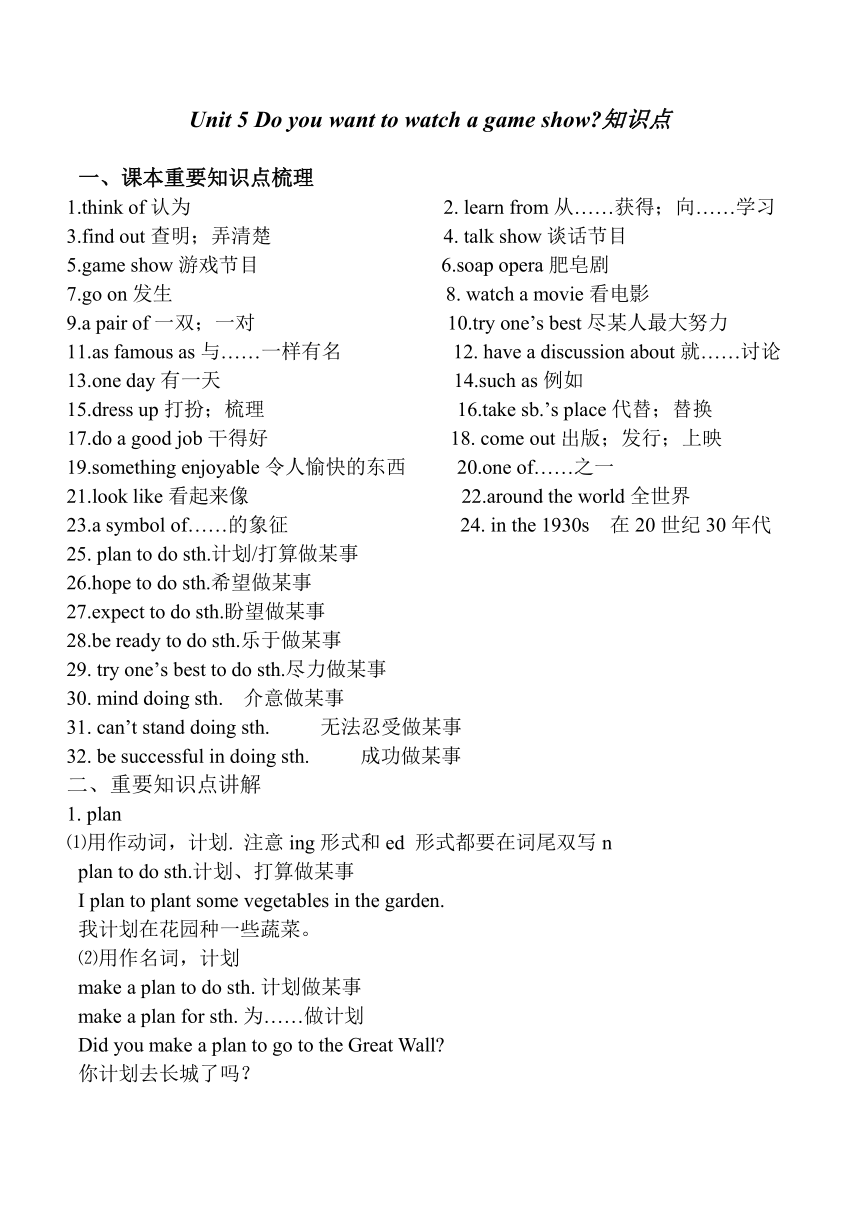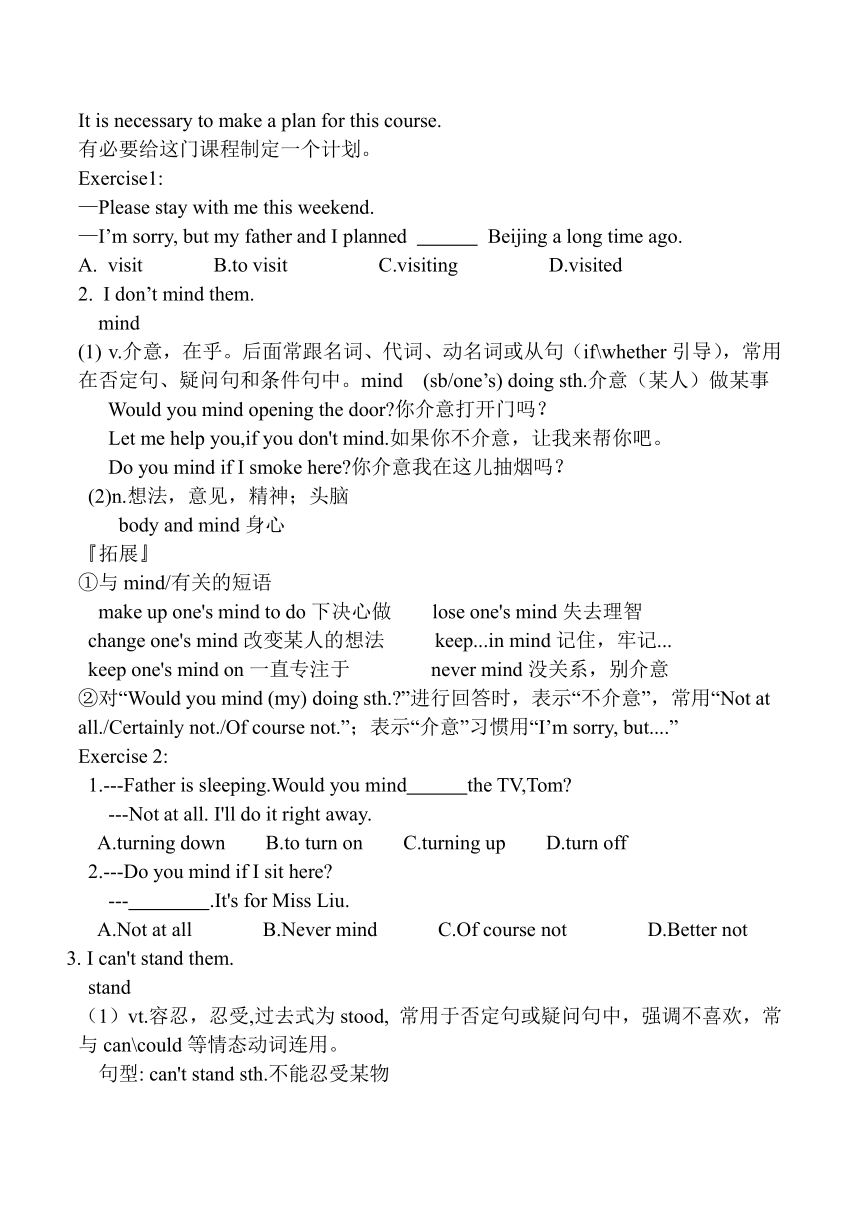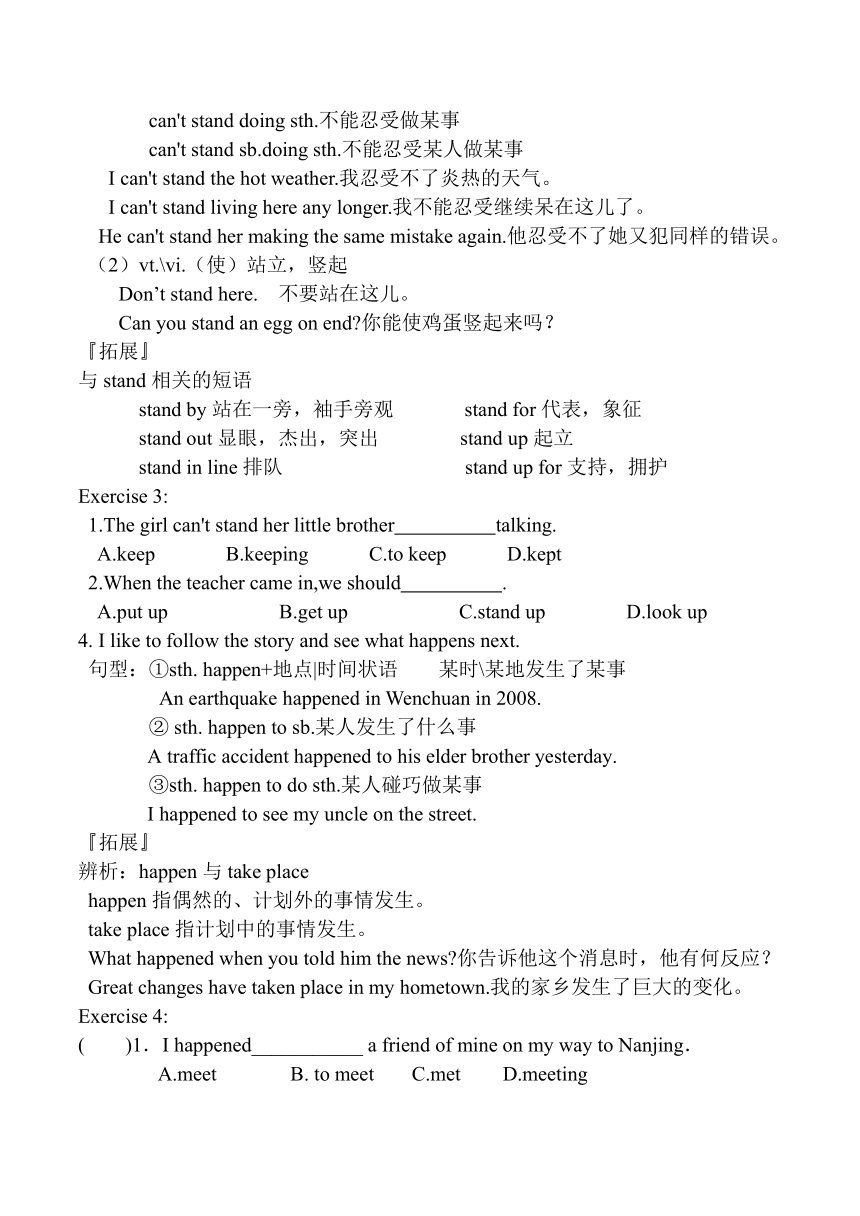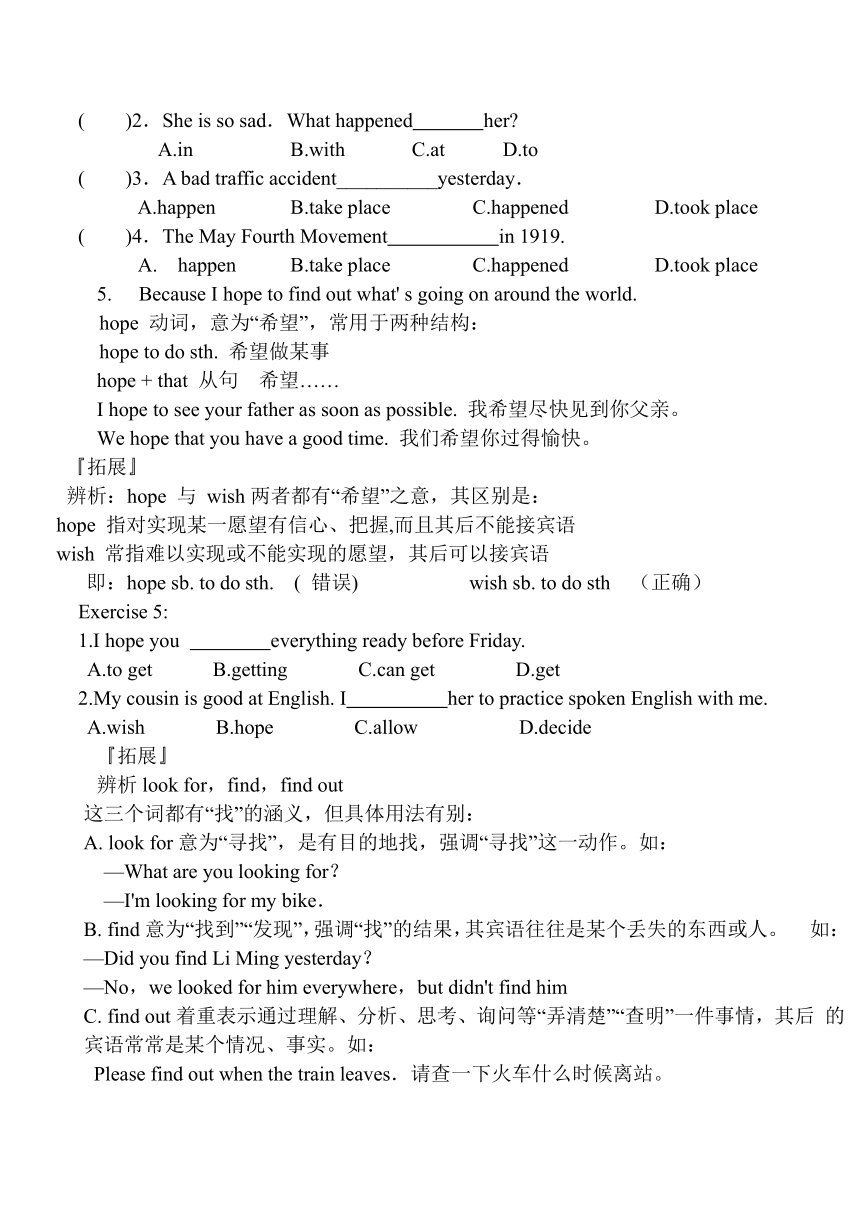人教新目标英语八年级上Unit 5 Do you want to watch a game show?单元知识点
文档属性
| 名称 | 人教新目标英语八年级上Unit 5 Do you want to watch a game show?单元知识点 |  | |
| 格式 | zip | ||
| 文件大小 | 93.0KB | ||
| 资源类型 | 教案 | ||
| 版本资源 | 人教新目标(Go for it)版 | ||
| 科目 | 英语 | ||
| 更新时间 | 2020-11-23 21:47:12 | ||
图片预览




文档简介
Unit
5
Do
you
want
to
watch
a
game
show?知识点
一、课本重要知识点梳理
1.think
of认为
2.
learn
from从……获得;向……学习
3.find
out查明;弄清楚
4.
talk
show谈话节目
5.game
show游戏节目
6.soap
opera肥皂剧
7.go
on发生
8.
watch
a
movie看电影
9.a
pair
of一双;一对
10.try
one’s
best尽某人最大努力
11.as
famous
as与……一样有名
12.
have
a
discussion
about就……讨论
13.one
day有一天
14.such
as例如
15.dress
up打扮;梳理
16.take
sb.’s
place代替;替换
17.do
a
good
job干得好
18.
come
out出版;发行;上映
19.something
enjoyable令人愉快的东西
20.one
of……之一
21.look
like看起来像
22.around
the
world全世界
23.a
symbol
of……的象征
24.
in
the
1930s
在20世纪30年代
25.
plan
to
do
sth.计划/打算做某事
26.hope
to
do
sth.希望做某事
27.expect
to
do
sth.盼望做某事
28.be
ready
to
do
sth.乐于做某事
29.
try
one’s
best
to
do
sth.尽力做某事
30.
mind
doing
sth.
介意做某事
31.
can’t
stand
doing
sth.
无法忍受做某事
32.
be
successful
in
doing
sth.
成功做某事
二、重要知识点讲解
1.
plan
⑴用作动词,计划.
注意ing形式和ed
形式都要在词尾双写n
plan
to
do
sth.计划、打算做某事
I
plan
to
plant
some
vegetables
in
the
garden.
我计划在花园种一些蔬菜。
⑵用作名词,计划
make
a
plan
to
do
sth.?计划做某事
make
a
plan
for
sth.?为……做计划
Did
you
make
a
plan
to
go
to
the
Great
Wall??
你计划去长城了吗?
It
is
necessary
to
make
a
plan
for
this
course.
有必要给这门课程制定一个计划。
Exercise1:
—Please
stay
with
me
this
weekend.
—I’m
sorry,
but
my
father
and
I
planned
Beijing
a
long
time
ago.
visit
B.to
visit
C.visiting
D.visited
I
don’t
mind
them.
mind
v.介意,在乎。后面常跟名词、代词、动名词或从句(if\whether引导),常用在否定句、疑问句和条件句中。mind
(sb/one’s)
doing
sth.介意(某人)做某事
Would
you
mind
opening
the
door?你介意打开门吗?
Let
me
help
you,if
you
don't
mind.如果你不介意,让我来帮你吧。
Do
you
mind
if
I
smoke
here?你介意我在这儿抽烟吗?
(2)n.想法,意见,精神;头脑
body
and
mind身心
『拓展』
①与mind/有关的短语
make
up
one's
mind
to
do下决心做
lose
one's
mind失去理智
change
one's
mind改变某人的想法
keep...in
mind记住,牢记...
keep
one's
mind
on一直专注于
never
mind没关系,别介意
②对“Would
you
mind
(my)
doing
sth.?”进行回答时,表示“不介意”,常用“Not
at
all./Certainly
not./Of
course
not.”;表示“介意”习惯用“I’m
sorry,
but....”
Exercise
2:
1.---Father
is
sleeping.Would
you
mind
the
TV,Tom?
---Not
at
all.
I'll
do
it
right
away.
A.turning
down
B.to
turn
on
C.turning
up
D.turn
off
2.---Do
you
mind
if
I
sit
here?
---
.It's
for
Miss
Liu.
A.Not
at
all
B.Never
mind
C.Of
course
not
D.Better
not
3.
I
can't
stand
them.
stand
(1)vt.容忍,忍受,过去式为stood,
常用于否定句或疑问句中,强调不喜欢,常与can\could等情态动词连用。
句型:
can't
stand
sth.不能忍受某物
can't
stand
doing
sth.不能忍受做某事
can't
stand
sb.doing
sth.不能忍受某人做某事
I
can't
stand
the
hot
weather.我忍受不了炎热的天气。
I
can't
stand
living
here
any
longer.我不能忍受继续呆在这儿了。
He
can't
stand
her
making
the
same
mistake
again.他忍受不了她又犯同样的错误。
(2)vt.\vi.(使)站立,竖起
Don’t
stand
here.
不要站在这儿。
Can
you
stand
an
egg
on
end?你能使鸡蛋竖起来吗?
『拓展』
与stand相关的短语
stand
by站在一旁,袖手旁观
stand
for代表,象征
stand
out显眼,杰出,突出
stand
up起立
stand
in
line排队
stand
up
for支持,拥护
Exercise
3:
1.The
girl
can't
stand
her
little
brother
talking.
A.keep
B.keeping
C.to
keep
D.kept
2.When
the
teacher
came
in,we
should
.
A.put
up
B.get
up
C.stand
up
D.look
up
4.
I
like
to
follow
the
story
and
see
what
happens
next.
句型:①sth.
happen+地点|时间状语
某时\某地发生了某事
An
earthquake
happened
in
Wenchuan
in
2008.
②
sth.
happen
to
sb.某人发生了什么事
A
traffic
accident
happened
to
his
elder
brother
yesterday.
③sth.
happen
to
do
sth.某人碰巧做某事
I
happened
to
see
my
uncle
on
the
street.
『拓展』
辨析:happen与take
place
happen指偶然的、计划外的事情发生。
take
place指计划中的事情发生。
What
happened
when
you
told
him
the
news?你告诉他这个消息时,他有何反应?
Great
changes
have
taken
place
in
my
hometown.我的家乡发生了巨大的变化。
Exercise
4:
(
)1.I
happened___________
a
friend
of
mine
on
my
way
to
Nanjing.
A.meet
B.
to
meet
C.met
D.meeting
(
)2.She
is
so
sad.What
happened
her?
A.in
B.with
C.at
D.to
(
)3.A
bad
traffic
accident__________yesterday.
A.happen
B.take
place
C.happened
D.took
place
(
)4.The
May
Fourth
Movement
in
1919.
happen
B.take
place
C.happened
D.took
place
Because
I
hope
to
find
out
what'
s
going
on
around
the
world.
hope
动词,意为“希望”,常用于两种结构:
hope
to
do
sth.
希望做某事
hope
+
that
从句
希望……
I
hope
to
see
your
father
as
soon
as
possible.
我希望尽快见到你父亲。
We
hope
that
you
have
a
good
time.
我们希望你过得愉快。
『拓展』
辨析:hope
与
wish两者都有“希望”之意,其区别是:
hope
指对实现某一愿望有信心、把握,而且其后不能接宾语
wish
常指难以实现或不能实现的愿望,其后可以接宾语
即:hope
sb.
to
do
sth.
(
错误)
wish
sb.
to
do
sth
(正确)
Exercise
5:
I
hope
you
everything
ready
before
Friday.
A.to
get
B.getting
C.can
get
D.get
2.My
cousin
is
good
at
English.
I
her
to
practice
spoken
English
with
me.
A.wish
B.hope
C.allow
D.decide
『拓展』
辨析look
for,find,find
out
这三个词都有“找”的涵义,但具体用法有别:?
A.
look
for意为“寻找”,是有目的地找,强调“寻找”这一动作。如:?
—What
are
you
looking
for??
—I'm
looking
for
my
bike.?
B.
find意为“找到”“发现”,强调“找”的结果,其宾语往往是某个丢失的东西或人。
如:?
—Did
you
find
Li
Ming
yesterday?
—No,we
looked
for
him
everywhere,but
didn't
find
him
C.
find
out着重表示通过理解、分析、思考、询问等“弄清楚”“查明”一件事情,其后
的
宾语常常是某个情况、事实。如:?
Please
find
out
when
the
train
leaves.请查一下火车什么时候离站。
6.I
hope
to
be
a
TV
reporter
one
day.
one
day
意为“有一天”。可以表示过去的某一天,也可以用于表示将来的某一天。
One
day
I
met
my
Chinese
teacher
on
the
street.有一天我在街上遇到了我的语文老师。
I
hope
that
one
day
skipping
will
be
an
event
of
the
Olympic
Games.
我希望有一天跳绳成为奥运会的一个项目。
『拓展』
some
day
意为“某一天”,表示将来的有一天或日后的某一天。在表示将来某一天时可以与one
day
互换。
I
will
go
to
see
you
some
day.
日后我会去看你的。
7.But
one
very
famous
symbol
in
American
culture
is
a
cartoon.
famous
形容词,意为“著名的”
辨析:
(1).be
famous
for,
因为.........而出名,后接闻名的原因,与be
well-known
for
同义。
This
place
is
famous
for
its
cotton.
这个地方以出产棉花而出名。
(2).be
famous
as,
作为.........而闻名
,后接表示职位、名称等的词,与be
well-known
as
同义.
Jet
Li
is
famous
as
a
actor
in
the
world.
李连杰是世界上著名的演员。
(3).be
famous
to,
为.......所熟知,后接某部分人。
This
singer
is
famous
to
lots
of
old
people.
许多老人都熟知这位歌手。
Exercise
6:
Yao
Ming
is
famous
playing
basketball,and
he
is
famous
a
basketball
player.
to;
as
B.as;
for
C.for;
to
D.for;
as
He
became
very
rich
and
successful.
successful
adj.成功的,有成就的
He
is
a
successful
manager.他是一位成功的经理。
『拓展』
(1)success
不可数名词,成功;
可数名词,成功的人\事
Last
week's
talent
show
was
a
great
success.上周的才艺表演非常成功。
succeed
vi.成功
succeed
in
doing
sth.做某事取得成功
China
has
succeeded
in
holding
the
2008
Olympic.中国成功举办2008年奥运会。
successfully
adv.成功地
They
finished
building
the
bridge
successfully.他们成功地建成了那座大桥。
注意:表示"成功"的各种形式,后常接介词的in.
I
wished
her
success
in
her
new
school.我祝愿她在新学校取得成功。
助记:success(名词
成功)
+-ful(
形容词后缀)
→successful(形容词
成功的)
+-ly
(副词后缀)→successfully
(副词
成功地)
ready?adj.愿意的;准备好的
The
dinner
is
ready.?晚饭准备好了。
⑴be
ready
to?随时可(乐意,即将);准备好
He
is
ready
to
join
the
activity.?他很乐意参加这个活动。
⑵be
ready
for?为……做好准备
I
must
be
ready
for
the
test.
我必须为考试做好准备。
Exercise
7:
My
English
teacher
is
always
r
with
advice
for
our
study
and
life.
三、重要语法讲解:动词不定式作宾语
?动词不定式的一般结构是“to+动词原形”,其否定形式为“not
to+动词原形”。动词不定式没有人称和数的变化,在句中不能作谓语。
动词不定式作宾语
?(一)动词不定式作宾语,表明意图,希望或决定的内容。
1.有些及物动词如need,agree,ask,decide,choose,hope,offer,plan,hate,refuse等用不定式做宾语,结构为“动词+不定式”。
He
offered
to
help
me.他表示愿意帮助我。
He
decided
to
buy
a
new
car.
他决定买辆新车。
助记口诀:
需要拒绝莫忘记,
(need,
refuse,
forget
)
想要学习就努力,
(want,
learn,
try
)
希望帮助并同意,
(hope/wish,
help,
agree
)
喜欢决定后开始。
(like,
decide,
begin/start)
2.有些动词如ask,help,like,love,need,prefer,want,choose等除了可以用不定式作宾语,还可以用不定式作补语,即:动词+宾语+不定式。
I
like
you
to
keep
everything
tidy.我喜欢你使每件东西都保持整洁。
3.有些动词或动词词组如decide,
know,
show
,tell,
forget,
remember,
learn
,find
out等可以用“疑问词加不定式”结构作宾语。
Please
show
us
how
to
do
that.请演示给我们如何去做。
They
haven’t
decided
whether
to
accept
the
invitation.
他们还没有决定是否接受邀请。
4.find/feel/think+it+adj./n.+to
do
sth.句型中it是形式宾语,真正的宾语是后面的动词不定式。
The
man
downstairs
found
it
difficult
to
get
to
sleep.楼下的人发觉难以入睡。
I
feel
it
my
duty
to
help
them.我感到帮助他们是我的责任。
5.动词forget,remember,stop,go
on等之后接V-ing
形式和不定式作宾语意义差别较大。
stop
to
do
sth
表示
停下来做某事
stop
doing
sth
表示
停止做某事
I’m
tired.
Let’s
stop
to
have
a
rest.
It’s
time
for
class.
Stop
talking.
forget
to
do
sth
忘记做某事
forget
doing
sth
忘记做过某事
Don’t
forget
to
close
the
door
I
forgot
telling
you
that
before.
remember
to
do
sth
记住做某事
remember
doing
sth
记住做过某事了
We
must
remember
to
turn
off
the
TV.
I
remembered
sending
you
some
letters.
try
to
do
sth
设法做某事(下了点决心)还没做
try
doing
sth
尝试做某事(只是试试看)
I
must
try
to
make
a
cake.
I
tried
to
making
a
cake
but
failed.
?(二)双宾语
当动词有两个宾语时,一般结构是:动词+人+物,我们把这种结构称作双宾语。其中人被称做间接宾语,物被称作直接宾语。
He
give
her
some
money.=
He
give
some
money
to
her.
My
parents
bought
me
a
computer.=My
parents
bought
a
computer
for
me.
3.动词跟双宾语,间接宾语改为由介词to
或for引起的短语时,用to侧重指动作的方向,表示朝着,向着,对着某人。由to引出间接宾语的动词有:bring,give,show,pass,lend,take,tell,hand,offer,pay等。用for引出间接宾语的动词有:buy,
make,
cook,
get,
sing,
read,
choose,
draw,
find,
get
等
He
shows
a
picture
to
me.他向我展示了一幅图画。
She
made
a
beautiful
dress
for
me.她为我做了一件漂亮的衣服。
(三)动词不定式三注意
1.?感观动词的使用
常见的有“一感二听三让四看半帮助”几种情况。即feel
sb
do
sth;
listen/
hear
sb
do;
make/
let/
have
sb
do
sth;
look
at/
see/
watch/
notice
sb
do
sth;
help
sb
(
to
)
do
sth。
I
often
hear
Molly
sing
songs
in
her
room.??我经常听见莫利在她的房间里唱歌.
Don’t
make
him
stand
outside.?别让他在外边站着了。
?若表示“看到/听到/感觉到某人正在做某事”,则用see/
hear/
feel
sb
doing
sth.
如:I
can
hear
someone
singing
at
the
door.?我能听见有人正在门口唱歌。
2.?疑问词+不定式,不定式可以和疑问词what,
how,
when,
where?等连用,共同作句子的宾语或表语等,但此时不定式一定要放在疑问词的后面。
如:Can
you
show
me
how
to
turn
off
the
computer?
你能让我看看如何关电脑吗??(how
to
do
sth?作宾语)
Where
to
spend
the
weekend
hasn’t
been
decided
yet.
去哪里度过周末还没有被决定出来呢。(where
to
do
sth?作主语)
3.?不定式和it
不定式可以作句子的主语和宾语,但有时候它们因太长而显得句子结构不够完美,故常用it?来代替它作形式主语或形式宾语。
常见的句型有以下两个:
①?It
be
+
adj
+
for
sb
to
do
sth.对某人来说做某事怎么样。(it?作形式主语)
②?sb
thinks/
find
it
+
adj
+
to
do
sth.某人认为(发现)做某事怎么样。
(it?作形式宾语)
It
is
very
easy
for
me
to
answer
that
question.?对我来说,回答那个问题是很容易的。
Did
you
find
it
hard
to
solve
the
problem??????你觉得解决那个问题很难吗?
用所给词的适当形式填空
We
planned
___________(make)
a
school
radio
program.
Do
you
know
when_________
(start)
the
party?
I
find
it
very
interesting
___________(talk)
with
foreigners.
Do
you
really
enjoy
_________(play)
the
violin
every
day.
My
parents
asked
me
_________(do)
my
homework
on
time.
I’m
really
sorry
.
I
forgot
__________(close)
the
door
before
I
left.
Betty
,
we
need
__________(make)
a
plan.
Please
remember
______________(post)
the
letter
for
the
old
man.
Stop
___________(chat),
everyone.
Our
English
teacher
is
coming.
It
started__________(rain)
when
we
were
walking
in
the
street
last
Sunday.
附:构词法
(1)meaningless毫无意义的
meaningless
adj.毫无意义的,意思不明确的
N.+less
adj.
表示"无"之意
careless粗心的
homeless无家可归的
helpless无助的
hopeless没有希望的
useless无用的
windless无风的
拓展(1)meaning
n.意义,含义,重要性
adj.有意义的
a
meaning
smile意味深长的微笑
(2)meaningful
adj.有意义的,意义深长的
(2)
John
wants
to
watch
talk
shows
because
they
are
enjoyable.约翰喜欢看访谈节目,因他们令人愉快。
enjoyable
adj.愉快的,快乐的
We
had
an
enjoyable
time
in
the
Forest
Garden
yesterday.
我们昨天在森林公园玩得很开心。
拓展:(1)v.+able
adj.表示"能够,适于,值得"
eatable能吃的
countable可数的
valuable有价值的
comfortable舒适的
unforgettable难以忘记的
unbelievable难以置信的
常见的形容词后缀
-ful
表示"充满的"
beautiful
colorful
successful
wonderful
careful
helpful
-less表示"没有,无"
careless
meaningless
homeless
hopeless
useless
helpless
-y表示性质
windy
sunny
funny
healthy
snowy
rainy
-al表示"...的"
educational
traditional
international(国际的)
natural(自然的)
-ing
表示"令人..."
interesting
exciting
surprising
-ed
表示"感到..."
interested
excited
surprised
relaxed
bored
tired
5
Do
you
want
to
watch
a
game
show?知识点
一、课本重要知识点梳理
1.think
of认为
2.
learn
from从……获得;向……学习
3.find
out查明;弄清楚
4.
talk
show谈话节目
5.game
show游戏节目
6.soap
opera肥皂剧
7.go
on发生
8.
watch
a
movie看电影
9.a
pair
of一双;一对
10.try
one’s
best尽某人最大努力
11.as
famous
as与……一样有名
12.
have
a
discussion
about就……讨论
13.one
day有一天
14.such
as例如
15.dress
up打扮;梳理
16.take
sb.’s
place代替;替换
17.do
a
good
job干得好
18.
come
out出版;发行;上映
19.something
enjoyable令人愉快的东西
20.one
of……之一
21.look
like看起来像
22.around
the
world全世界
23.a
symbol
of……的象征
24.
in
the
1930s
在20世纪30年代
25.
plan
to
do
sth.计划/打算做某事
26.hope
to
do
sth.希望做某事
27.expect
to
do
sth.盼望做某事
28.be
ready
to
do
sth.乐于做某事
29.
try
one’s
best
to
do
sth.尽力做某事
30.
mind
doing
sth.
介意做某事
31.
can’t
stand
doing
sth.
无法忍受做某事
32.
be
successful
in
doing
sth.
成功做某事
二、重要知识点讲解
1.
plan
⑴用作动词,计划.
注意ing形式和ed
形式都要在词尾双写n
plan
to
do
sth.计划、打算做某事
I
plan
to
plant
some
vegetables
in
the
garden.
我计划在花园种一些蔬菜。
⑵用作名词,计划
make
a
plan
to
do
sth.?计划做某事
make
a
plan
for
sth.?为……做计划
Did
you
make
a
plan
to
go
to
the
Great
Wall??
你计划去长城了吗?
It
is
necessary
to
make
a
plan
for
this
course.
有必要给这门课程制定一个计划。
Exercise1:
—Please
stay
with
me
this
weekend.
—I’m
sorry,
but
my
father
and
I
planned
Beijing
a
long
time
ago.
visit
B.to
visit
C.visiting
D.visited
I
don’t
mind
them.
mind
v.介意,在乎。后面常跟名词、代词、动名词或从句(if\whether引导),常用在否定句、疑问句和条件句中。mind
(sb/one’s)
doing
sth.介意(某人)做某事
Would
you
mind
opening
the
door?你介意打开门吗?
Let
me
help
you,if
you
don't
mind.如果你不介意,让我来帮你吧。
Do
you
mind
if
I
smoke
here?你介意我在这儿抽烟吗?
(2)n.想法,意见,精神;头脑
body
and
mind身心
『拓展』
①与mind/有关的短语
make
up
one's
mind
to
do下决心做
lose
one's
mind失去理智
change
one's
mind改变某人的想法
keep...in
mind记住,牢记...
keep
one's
mind
on一直专注于
never
mind没关系,别介意
②对“Would
you
mind
(my)
doing
sth.?”进行回答时,表示“不介意”,常用“Not
at
all./Certainly
not./Of
course
not.”;表示“介意”习惯用“I’m
sorry,
but....”
Exercise
2:
1.---Father
is
sleeping.Would
you
mind
the
TV,Tom?
---Not
at
all.
I'll
do
it
right
away.
A.turning
down
B.to
turn
on
C.turning
up
D.turn
off
2.---Do
you
mind
if
I
sit
here?
---
.It's
for
Miss
Liu.
A.Not
at
all
B.Never
mind
C.Of
course
not
D.Better
not
3.
I
can't
stand
them.
stand
(1)vt.容忍,忍受,过去式为stood,
常用于否定句或疑问句中,强调不喜欢,常与can\could等情态动词连用。
句型:
can't
stand
sth.不能忍受某物
can't
stand
doing
sth.不能忍受做某事
can't
stand
sb.doing
sth.不能忍受某人做某事
I
can't
stand
the
hot
weather.我忍受不了炎热的天气。
I
can't
stand
living
here
any
longer.我不能忍受继续呆在这儿了。
He
can't
stand
her
making
the
same
mistake
again.他忍受不了她又犯同样的错误。
(2)vt.\vi.(使)站立,竖起
Don’t
stand
here.
不要站在这儿。
Can
you
stand
an
egg
on
end?你能使鸡蛋竖起来吗?
『拓展』
与stand相关的短语
stand
by站在一旁,袖手旁观
stand
for代表,象征
stand
out显眼,杰出,突出
stand
up起立
stand
in
line排队
stand
up
for支持,拥护
Exercise
3:
1.The
girl
can't
stand
her
little
brother
talking.
A.keep
B.keeping
C.to
keep
D.kept
2.When
the
teacher
came
in,we
should
.
A.put
up
B.get
up
C.stand
up
D.look
up
4.
I
like
to
follow
the
story
and
see
what
happens
next.
句型:①sth.
happen+地点|时间状语
某时\某地发生了某事
An
earthquake
happened
in
Wenchuan
in
2008.
②
sth.
happen
to
sb.某人发生了什么事
A
traffic
accident
happened
to
his
elder
brother
yesterday.
③sth.
happen
to
do
sth.某人碰巧做某事
I
happened
to
see
my
uncle
on
the
street.
『拓展』
辨析:happen与take
place
happen指偶然的、计划外的事情发生。
take
place指计划中的事情发生。
What
happened
when
you
told
him
the
news?你告诉他这个消息时,他有何反应?
Great
changes
have
taken
place
in
my
hometown.我的家乡发生了巨大的变化。
Exercise
4:
(
)1.I
happened___________
a
friend
of
mine
on
my
way
to
Nanjing.
A.meet
B.
to
meet
C.met
D.meeting
(
)2.She
is
so
sad.What
happened
her?
A.in
B.with
C.at
D.to
(
)3.A
bad
traffic
accident__________yesterday.
A.happen
B.take
place
C.happened
D.took
place
(
)4.The
May
Fourth
Movement
in
1919.
happen
B.take
place
C.happened
D.took
place
Because
I
hope
to
find
out
what'
s
going
on
around
the
world.
hope
动词,意为“希望”,常用于两种结构:
hope
to
do
sth.
希望做某事
hope
+
that
从句
希望……
I
hope
to
see
your
father
as
soon
as
possible.
我希望尽快见到你父亲。
We
hope
that
you
have
a
good
time.
我们希望你过得愉快。
『拓展』
辨析:hope
与
wish两者都有“希望”之意,其区别是:
hope
指对实现某一愿望有信心、把握,而且其后不能接宾语
wish
常指难以实现或不能实现的愿望,其后可以接宾语
即:hope
sb.
to
do
sth.
(
错误)
wish
sb.
to
do
sth
(正确)
Exercise
5:
I
hope
you
everything
ready
before
Friday.
A.to
get
B.getting
C.can
get
D.get
2.My
cousin
is
good
at
English.
I
her
to
practice
spoken
English
with
me.
A.wish
B.hope
C.allow
D.decide
『拓展』
辨析look
for,find,find
out
这三个词都有“找”的涵义,但具体用法有别:?
A.
look
for意为“寻找”,是有目的地找,强调“寻找”这一动作。如:?
—What
are
you
looking
for??
—I'm
looking
for
my
bike.?
B.
find意为“找到”“发现”,强调“找”的结果,其宾语往往是某个丢失的东西或人。
如:?
—Did
you
find
Li
Ming
yesterday?
—No,we
looked
for
him
everywhere,but
didn't
find
him
C.
find
out着重表示通过理解、分析、思考、询问等“弄清楚”“查明”一件事情,其后
的
宾语常常是某个情况、事实。如:?
Please
find
out
when
the
train
leaves.请查一下火车什么时候离站。
6.I
hope
to
be
a
TV
reporter
one
day.
one
day
意为“有一天”。可以表示过去的某一天,也可以用于表示将来的某一天。
One
day
I
met
my
Chinese
teacher
on
the
street.有一天我在街上遇到了我的语文老师。
I
hope
that
one
day
skipping
will
be
an
event
of
the
Olympic
Games.
我希望有一天跳绳成为奥运会的一个项目。
『拓展』
some
day
意为“某一天”,表示将来的有一天或日后的某一天。在表示将来某一天时可以与one
day
互换。
I
will
go
to
see
you
some
day.
日后我会去看你的。
7.But
one
very
famous
symbol
in
American
culture
is
a
cartoon.
famous
形容词,意为“著名的”
辨析:
(1).be
famous
for,
因为.........而出名,后接闻名的原因,与be
well-known
for
同义。
This
place
is
famous
for
its
cotton.
这个地方以出产棉花而出名。
(2).be
famous
as,
作为.........而闻名
,后接表示职位、名称等的词,与be
well-known
as
同义.
Jet
Li
is
famous
as
a
actor
in
the
world.
李连杰是世界上著名的演员。
(3).be
famous
to,
为.......所熟知,后接某部分人。
This
singer
is
famous
to
lots
of
old
people.
许多老人都熟知这位歌手。
Exercise
6:
Yao
Ming
is
famous
playing
basketball,and
he
is
famous
a
basketball
player.
to;
as
B.as;
for
C.for;
to
D.for;
as
He
became
very
rich
and
successful.
successful
adj.成功的,有成就的
He
is
a
successful
manager.他是一位成功的经理。
『拓展』
(1)success
不可数名词,成功;
可数名词,成功的人\事
Last
week's
talent
show
was
a
great
success.上周的才艺表演非常成功。
succeed
vi.成功
succeed
in
doing
sth.做某事取得成功
China
has
succeeded
in
holding
the
2008
Olympic.中国成功举办2008年奥运会。
successfully
adv.成功地
They
finished
building
the
bridge
successfully.他们成功地建成了那座大桥。
注意:表示"成功"的各种形式,后常接介词的in.
I
wished
her
success
in
her
new
school.我祝愿她在新学校取得成功。
助记:success(名词
成功)
+-ful(
形容词后缀)
→successful(形容词
成功的)
+-ly
(副词后缀)→successfully
(副词
成功地)
ready?adj.愿意的;准备好的
The
dinner
is
ready.?晚饭准备好了。
⑴be
ready
to?随时可(乐意,即将);准备好
He
is
ready
to
join
the
activity.?他很乐意参加这个活动。
⑵be
ready
for?为……做好准备
I
must
be
ready
for
the
test.
我必须为考试做好准备。
Exercise
7:
My
English
teacher
is
always
r
with
advice
for
our
study
and
life.
三、重要语法讲解:动词不定式作宾语
?动词不定式的一般结构是“to+动词原形”,其否定形式为“not
to+动词原形”。动词不定式没有人称和数的变化,在句中不能作谓语。
动词不定式作宾语
?(一)动词不定式作宾语,表明意图,希望或决定的内容。
1.有些及物动词如need,agree,ask,decide,choose,hope,offer,plan,hate,refuse等用不定式做宾语,结构为“动词+不定式”。
He
offered
to
help
me.他表示愿意帮助我。
He
decided
to
buy
a
new
car.
他决定买辆新车。
助记口诀:
需要拒绝莫忘记,
(need,
refuse,
forget
)
想要学习就努力,
(want,
learn,
try
)
希望帮助并同意,
(hope/wish,
help,
agree
)
喜欢决定后开始。
(like,
decide,
begin/start)
2.有些动词如ask,help,like,love,need,prefer,want,choose等除了可以用不定式作宾语,还可以用不定式作补语,即:动词+宾语+不定式。
I
like
you
to
keep
everything
tidy.我喜欢你使每件东西都保持整洁。
3.有些动词或动词词组如decide,
know,
show
,tell,
forget,
remember,
learn
,find
out等可以用“疑问词加不定式”结构作宾语。
Please
show
us
how
to
do
that.请演示给我们如何去做。
They
haven’t
decided
whether
to
accept
the
invitation.
他们还没有决定是否接受邀请。
4.find/feel/think+it+adj./n.+to
do
sth.句型中it是形式宾语,真正的宾语是后面的动词不定式。
The
man
downstairs
found
it
difficult
to
get
to
sleep.楼下的人发觉难以入睡。
I
feel
it
my
duty
to
help
them.我感到帮助他们是我的责任。
5.动词forget,remember,stop,go
on等之后接V-ing
形式和不定式作宾语意义差别较大。
stop
to
do
sth
表示
停下来做某事
stop
doing
sth
表示
停止做某事
I’m
tired.
Let’s
stop
to
have
a
rest.
It’s
time
for
class.
Stop
talking.
forget
to
do
sth
忘记做某事
forget
doing
sth
忘记做过某事
Don’t
forget
to
close
the
door
I
forgot
telling
you
that
before.
remember
to
do
sth
记住做某事
remember
doing
sth
记住做过某事了
We
must
remember
to
turn
off
the
TV.
I
remembered
sending
you
some
letters.
try
to
do
sth
设法做某事(下了点决心)还没做
try
doing
sth
尝试做某事(只是试试看)
I
must
try
to
make
a
cake.
I
tried
to
making
a
cake
but
failed.
?(二)双宾语
当动词有两个宾语时,一般结构是:动词+人+物,我们把这种结构称作双宾语。其中人被称做间接宾语,物被称作直接宾语。
He
give
her
some
money.=
He
give
some
money
to
her.
My
parents
bought
me
a
computer.=My
parents
bought
a
computer
for
me.
3.动词跟双宾语,间接宾语改为由介词to
或for引起的短语时,用to侧重指动作的方向,表示朝着,向着,对着某人。由to引出间接宾语的动词有:bring,give,show,pass,lend,take,tell,hand,offer,pay等。用for引出间接宾语的动词有:buy,
make,
cook,
get,
sing,
read,
choose,
draw,
find,
get
等
He
shows
a
picture
to
me.他向我展示了一幅图画。
She
made
a
beautiful
dress
for
me.她为我做了一件漂亮的衣服。
(三)动词不定式三注意
1.?感观动词的使用
常见的有“一感二听三让四看半帮助”几种情况。即feel
sb
do
sth;
listen/
hear
sb
do;
make/
let/
have
sb
do
sth;
look
at/
see/
watch/
notice
sb
do
sth;
help
sb
(
to
)
do
sth。
I
often
hear
Molly
sing
songs
in
her
room.??我经常听见莫利在她的房间里唱歌.
Don’t
make
him
stand
outside.?别让他在外边站着了。
?若表示“看到/听到/感觉到某人正在做某事”,则用see/
hear/
feel
sb
doing
sth.
如:I
can
hear
someone
singing
at
the
door.?我能听见有人正在门口唱歌。
2.?疑问词+不定式,不定式可以和疑问词what,
how,
when,
where?等连用,共同作句子的宾语或表语等,但此时不定式一定要放在疑问词的后面。
如:Can
you
show
me
how
to
turn
off
the
computer?
你能让我看看如何关电脑吗??(how
to
do
sth?作宾语)
Where
to
spend
the
weekend
hasn’t
been
decided
yet.
去哪里度过周末还没有被决定出来呢。(where
to
do
sth?作主语)
3.?不定式和it
不定式可以作句子的主语和宾语,但有时候它们因太长而显得句子结构不够完美,故常用it?来代替它作形式主语或形式宾语。
常见的句型有以下两个:
①?It
be
+
adj
+
for
sb
to
do
sth.对某人来说做某事怎么样。(it?作形式主语)
②?sb
thinks/
find
it
+
adj
+
to
do
sth.某人认为(发现)做某事怎么样。
(it?作形式宾语)
It
is
very
easy
for
me
to
answer
that
question.?对我来说,回答那个问题是很容易的。
Did
you
find
it
hard
to
solve
the
problem??????你觉得解决那个问题很难吗?
用所给词的适当形式填空
We
planned
___________(make)
a
school
radio
program.
Do
you
know
when_________
(start)
the
party?
I
find
it
very
interesting
___________(talk)
with
foreigners.
Do
you
really
enjoy
_________(play)
the
violin
every
day.
My
parents
asked
me
_________(do)
my
homework
on
time.
I’m
really
sorry
.
I
forgot
__________(close)
the
door
before
I
left.
Betty
,
we
need
__________(make)
a
plan.
Please
remember
______________(post)
the
letter
for
the
old
man.
Stop
___________(chat),
everyone.
Our
English
teacher
is
coming.
It
started__________(rain)
when
we
were
walking
in
the
street
last
Sunday.
附:构词法
(1)meaningless毫无意义的
meaningless
adj.毫无意义的,意思不明确的
N.+less
adj.
表示"无"之意
careless粗心的
homeless无家可归的
helpless无助的
hopeless没有希望的
useless无用的
windless无风的
拓展(1)meaning
n.意义,含义,重要性
adj.有意义的
a
meaning
smile意味深长的微笑
(2)meaningful
adj.有意义的,意义深长的
(2)
John
wants
to
watch
talk
shows
because
they
are
enjoyable.约翰喜欢看访谈节目,因他们令人愉快。
enjoyable
adj.愉快的,快乐的
We
had
an
enjoyable
time
in
the
Forest
Garden
yesterday.
我们昨天在森林公园玩得很开心。
拓展:(1)v.+able
adj.表示"能够,适于,值得"
eatable能吃的
countable可数的
valuable有价值的
comfortable舒适的
unforgettable难以忘记的
unbelievable难以置信的
常见的形容词后缀
-ful
表示"充满的"
beautiful
colorful
successful
wonderful
careful
helpful
-less表示"没有,无"
careless
meaningless
homeless
hopeless
useless
helpless
-y表示性质
windy
sunny
funny
healthy
snowy
rainy
-al表示"...的"
educational
traditional
international(国际的)
natural(自然的)
-ing
表示"令人..."
interesting
exciting
surprising
-ed
表示"感到..."
interested
excited
surprised
relaxed
bored
tired
同课章节目录
- Unit 1 Where did you go on vacation?
- Section A
- Section B
- Unit 2 How often do you exercise?
- Section A
- Section B
- Unit 3 I'm more outgoing than my sister.
- Section A
- Section B
- Unit 4 What's the best movie theater?
- Section A
- Section B
- Unit 5 Do you want to watch a game show?
- Section A
- Section B
- Unit 6 I'm going to study computer science.
- Section A
- Section B
- Unit 7 Will people have robots?
- Section A
- Section B
- Unit 8 How do you make a banana milk shake?
- Section A
- Section B
- Unit 9 Can you come to my party?
- Section A
- Section B
- Unit 10 If you go to the party, you'll have a grea
- Section A
- Section B
